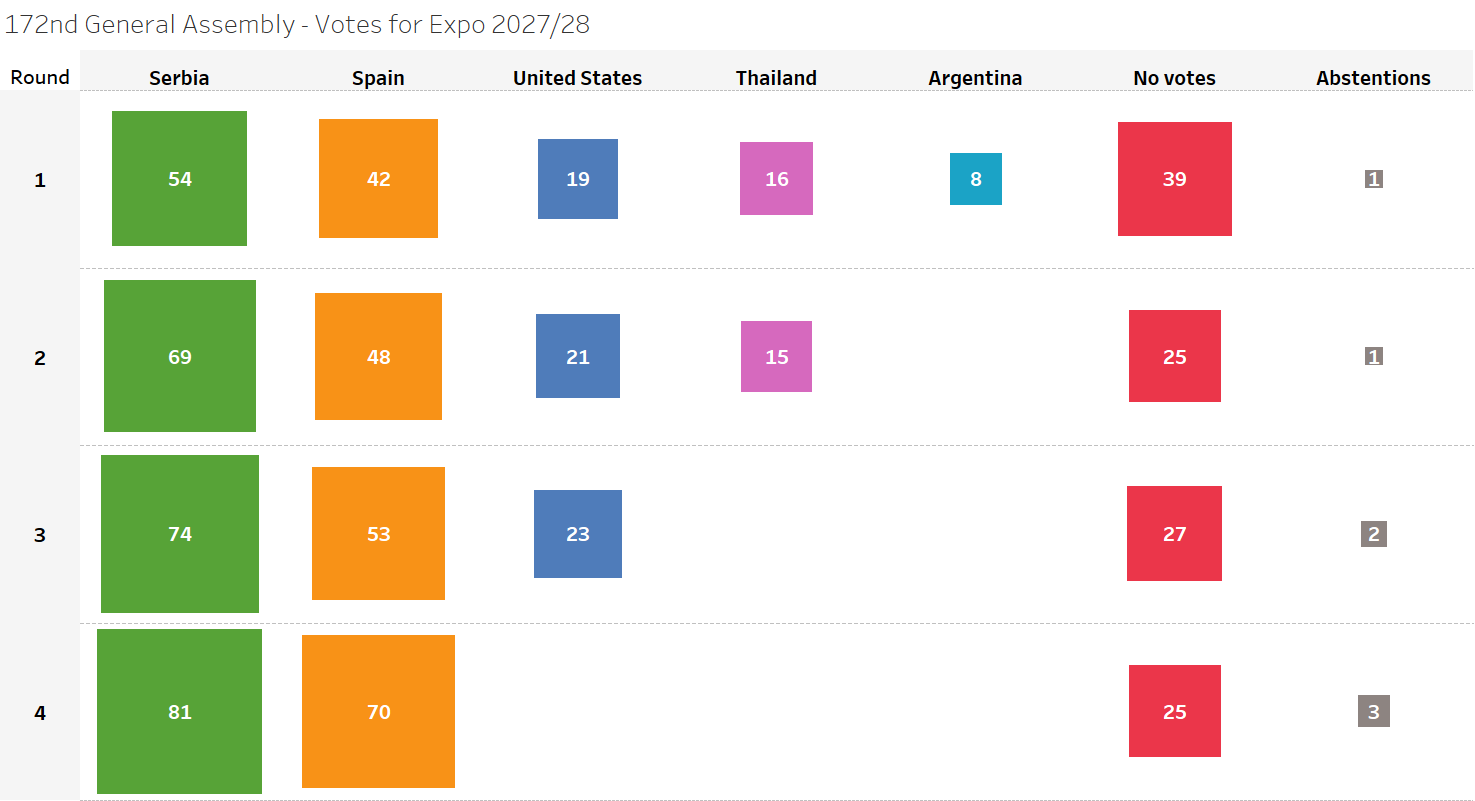Note from the CPD Blog Manager: This article was originally published by Project Syndicate here and is re-posted with permission. U.S. President Donald Trump’s administration has shown little interest...
KEEP READINGThe CPD Blog is intended to stimulate dialog among scholars and practitioners from around the world in the public diplomacy sphere. The opinions represented here are the authors' own and do not necessarily reflect CPD's views. For blogger guidelines, click here.

Bringing the Largest Public Diplomacy Event Back to the U.S.
On June 21, 2023, the 172nd General Assembly of the International Exhibitions Bureau (Bureau International des Expositions, BIE) convened in France to elect the host for Expo 2027/2028. After four rounds, Serbia won the right to host Expo 2027 Belgrade with 81 votes out of 179 member countries, beating second place Malaga, Spain; third place Minnesota, United States; fourth place Phuket, Thailand; and fifth place Bariloche, Argentina.
Expos are massive public education projects that boost the host country’s national economy by introducing the domestic population to foreign perspectives and ideas that inspire innovation. Expos also help the domestic population understand its role and potential on an international scale.
Unlike other mega-events like the FIFA Men’s World Cup™ and the Olympic Games, selecting a city to host an Expo primarily involves traditional diplomacy. FIFA and the IOC are private organizations. The BIE is an intergovernmental organization, which national governments join by ratifying the Convention relating to International Exhibitions of 1928.
FIFA has 211 member associations, which are representatives of FIFA around the world, and the IOC’s 107 members are “natural persons, [who] are representatives of the [IOC] in their respective countries.” The BIE has 182 member countries, each one represented at the General Assembly by duly accredited delegates. Private entities determine the host countries and cities for FIFA and IOC events. An assembly of national governments determines host cities for BIE Expos.
Through their BIE membership, national governments directly influence which country’s population stands to benefit from hosting this massive public education event. Votes to elect Expo host cities are usually decided by each member country at the Ministry of Foreign Affairs level, with each member country having one vote.
Insights for Expo-bidding countries
A brief analysis of the vote distribution for Expo 2027/2028 offers some lessons for the diplomatic efforts of countries bidding to host future Expos.
At the time of the vote, the BIE counted 179 member countries, yet 39 of them did not vote in the initial round—equivalent to 22% of BIE membership. A partial explanation is that, according to the Convention, countries falling behind in their annual membership fees forfeit their voting rights. However, 14 of those 39 countries did vote in the second round. Something failed in the diplomatic negotiations of five bidding countries that none of them secured the first-round vote of 14 full-right member countries attending the session.

On November 28, 2023, the 173rd BIE General Assembly will elect the host for Expo 2030. The window for bidding countries to persuade 25 member nations to settle their dues may have already closed, but there is still an opportunity to encourage full-right member countries to attend and cast their votes. While Spain, the U.S., Thailand, and Argentina missed their opportunity, securing those votes could be crucial for Italy, Saudi Arabia or South Korea, potentially marking the difference between hosting Expo 2030 and merely participating.
Lessons for the U.S.
The experience at the 172nd BIE General Assembly might discourage future U.S. efforts to host an Expo. In recent years, the U.S. has significantly increased its Expo engagement. Following notable absences at Expos 2000 Hannover and 2008 Zaragoza, the U.S. has improved the quality and institutional structure of its Expo participation. Minnesota's bid for Expo 2023 catalyzed the establishment of an Expo Unit within the Department of State and led to the renewal of U.S. membership in the BIE. Budget allocations for U.S. pavilions have been troublesome in Expos after 1992 Seville, but Congress has ultimately approved $25 million for the U.S. participation at Expo 2025 Osaka.
The White House and the Department of State's support for the latest Minnesota bid was commendable, with messages from President Joe Biden and Secretary of State Antony Blinken, and the participation of Undersecretary of State for Public Diplomacy and Public Affairs Liz Allen at the BIE General Assembly. However, these efforts are not enough to bring the largest public diplomacy event to the U.S. Despite all diplomatic efforts, the U.S. Expo 2027 bid began with 19 votes and never reached more than 23.
Based on recent experiences, any future efforts to host an Expo in the U.S. should be contingent on three fundamental assurances:
1. The BIE adopting an open voting system
The BIE employs a secret vote system where countries can promise a vote to more than one bidding country virtually without repercussions. Furthermore, it is unclear whether there are any mechanisms to impede delegates from voting differently than instructed by their own government. The U.S. needs to engage more actively to promote a more transparent voting process in the BIE and eliminate the potential of corruption.
2. Designating an experienced ambassador as Special Envoy to negotiate votes
While strategies to secure votes for Expos often remain confidential, the late Spanish ambassador José Manuel Paz Agüeras shared invaluable insights in a book about the diplomatic battle for Expo 2008 Zaragoza. To effectively influence the ministry of foreign affairs of each BIE member country, Spain appointed him—a seasoned career diplomat with an extensive diplomatic network and familiarity with high-level protocols—to spearhead the campaign for Expo 2008, mirroring the successful approach for Expo 1992 Seville. The U.S. cannot approach an Expo bid with less than that, and the figure of Special Envoy would provide additional authority to the position.
3. The Department of State finding a strategy to compete with countries involved in vote-trading
Vote-trading is a common practice in the international arena. According to Amb. Paz Agüeras, some Expo-bidding countries resort to vote-trading, which presumably, is not the tradition of the U.S. Department of State (a FOIA request by the author is pending an answer). If other nations offer incentives in exchange for votes and the U.S. refrains from doing so, then the U.S. must employ innovative strategies to level the playing field.
Bringing the Largest Public Diplomacy Event Back to the United States
Based on the BIE website, the U.S. has hosted 11 Expos since 1851—more than any other country. Not too long ago, the U.S. was so deeply involved in hosting Expos, that several were scheduled consecutively: 1962 Seattle, 1968 San Antonio, 1974 Spokane, 1981 Los Angeles (unanimously awarded by the BIE but canceled by the U.S.), 1982 Knoxville, 1984 New Orleans, and 1992 Chicago (also cancelled by the U.S.).
As the U.S. reflects on its past and future endeavors in hosting Expos, the path forward requires decisive involvement, strategic diplomacy, and innovative approaches. Expos hold the power to influence the world's future, and the U.S. has the potential to step up and inaugurate a fresh era of innovation and economic progress through these global mega-events.
Visit CPD's Online Library
Explore CPD's vast online database featuring the latest books, articles, speeches and information on international organizations dedicated to public diplomacy.
POPULAR ARTICLES
-
January 29
-
January 20
-
January 28
-
January 2
-
January 8
Join the Conversation
Interested in contributing to the CPD Blog? We welcome your posts. Read our guidelines and find out how you can submit blogs and photo essays >.














